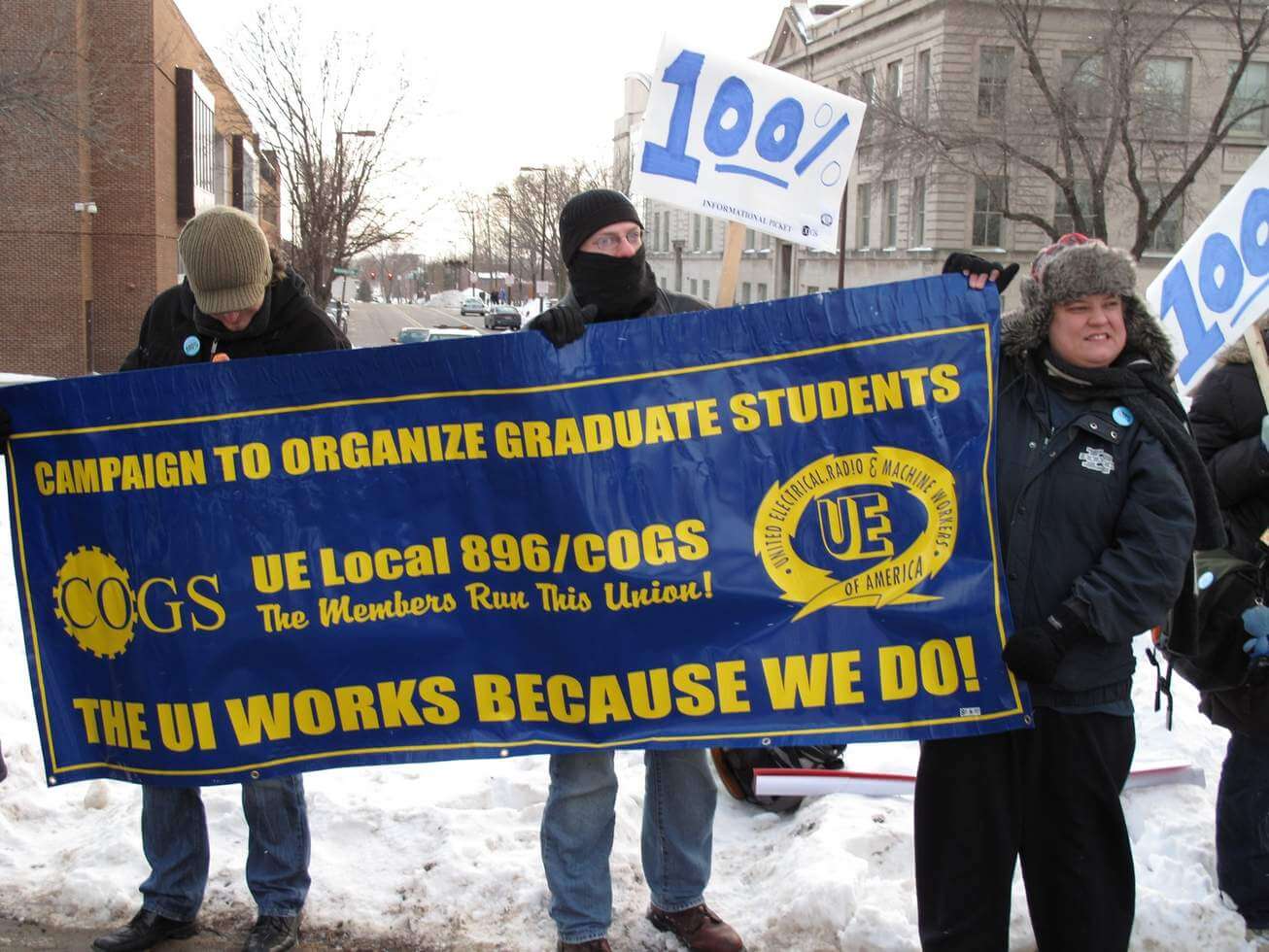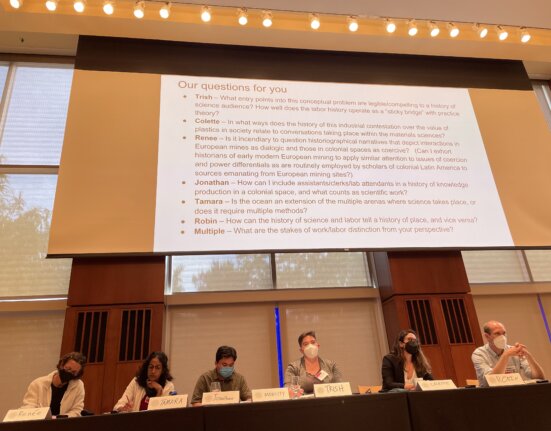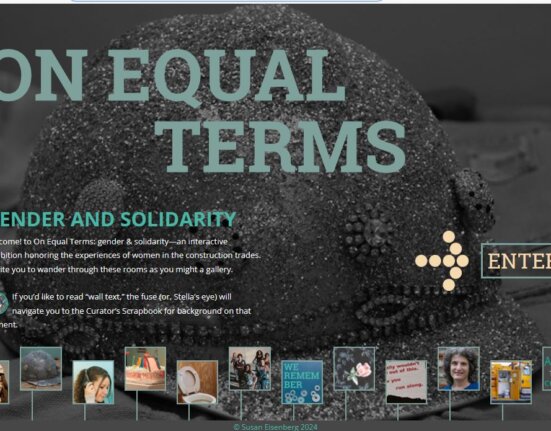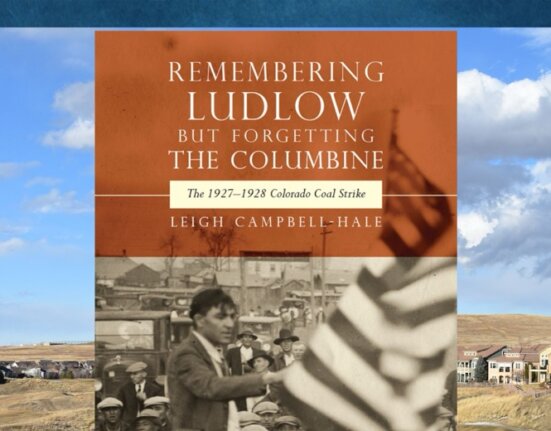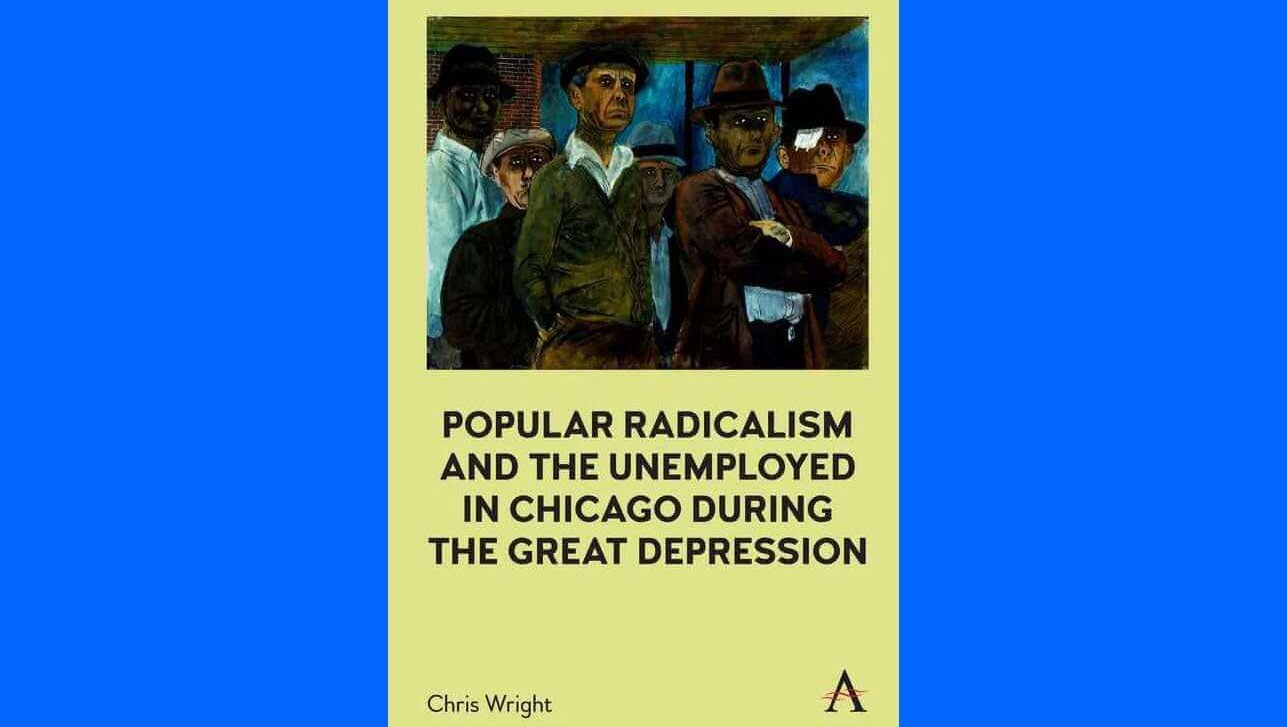April 16, 2016, was a day for celebration. It marked the twentieth anniversary of the union certification election that transformed a home-grown organizing campaign among graduate employees at the University of Iowa (UI)—the Campaign to Organize Graduate Students (COGS)—into Local 896 of the United Electrical, Radio, and Machine Workers of America (UE).
The anniversary was celebrated with three days of events hosted by COGS and co-sponsored by the national UE. It brought back to campus a host of COGS alumni like myself, revealing the degree to which the experience of being union members — and UE members in particular — continued to be a source of pride and inspiration. These alumni included scholars, teachers, and activists at a variety of institutions, including Alverno College and the University of Alabama; university-based labor educators in Missouri and Iowa; union staff members with the UE and SEIU; and the executive director of the American Association of University Professors.
These alumni were joined by current COGS officers and members; supportive faculty, staff, and community members; and fellow graduate employee activists from the University of Chicago and the University of Wisconsin-Madison. Conference events included sessions regarding efforts to win adequate parental leave and childcare policies, discussion of union representation among graduate employees across the nation, the release of a COGS-authored white paper detailing the concentration of money and influence within the UI’s top administration, and a rally to draw attention to COGS’ crucial role in current struggles at the university.

Credit: The Gazette
The celebration (and COGS’ past, present, and future) is worthy of wider consideration for several reasons. First, COGS’ origins are themselves historic. The 1996 election was the largest union victory in more than a decade in right-to-work Iowa and one of the largest nationwide that year. Next, COGS’ early history embodied innovative and instructive experiments in union organization and significant tensions between “social movement” and “bread-and-butter” unionism (while at once demonstrating the limits of counterposing the two in explaining internal union politics).

Most famously, COGS members tried to insert a “no-discrimination” clause into the union’s first contract. The clause was rejected by the university, however, in accordance with Iowa public employment relations law, which provides for the employer or union to refuse to bargain over anything outside of a narrow set of “mandatory” topics. At that point, a group of COGS officers and members staged a dramatic protest at a lecture given by civil rights historian Taylor Branch. That confrontation was described, from the perspective of a subset of pro-clause activists, in Robin D. G. Kelley’s 1997 Yo’ Mama’s Disfunktional!.
Although the protest was controversial within the local—with some officers and members fearing that it would compromise bargaining—pro-clause activists’ efforts to press members to reject any contract that did not contain the clause was far more so. These efforts split COGS, with many members in favor of the clause but with few willing to risk the contract as a whole to save it, especially because the contract provided a new, expansive, COGS-designed health insurance plan, UIGRADCare. The controversy also caused a rift between the pro-clause activists and the UE staff. While the pro-clause activists regarded staff members as focused on bread-and-butter issues to the exclusion of broader social and political goals, the staff feared that the activists represented a self-defeating form of ultra-leftwing orthodoxy.
Ultimately, COGS members voted to approve the contract without the clause, but pro-clause activists succeeded in creating a permanent “Unity” committee charged with promoting broad-based solidarity and anti-discrimination. This committee was to be chaired, whenever possible, by someone from a historically disempowered group, with the chair having membership on the local’s coordinating committee–its version of an executive board. The Unity committee was a self-conscious effort to build anti-discrimination and “minority” empowerment into the structure of the local. In the second contract negotiations, COGS members (with the support of UE staff) took up the issue again, winning a memorandum of understanding from the university and Board of Regents regarding discrimination that included a grievance procedure. Although this procedure fell short of the pro-clause activists’ original demand to integrate discrimination claims into the work-related grievance procedure, it proved to be a significant and winnable goal. Damage had been done, however, with pro-clause activists, including figures who had been important during the organizing campaign (and, indeed, in the choice to affiliate with UE), moving away from active participation in the local.
Despite such early controversies, since 1996, COGS members have increased graduate employee compensation from the bottom to the top of the Big Ten and expanded UIGRADCare into arguably the best and most comprehensive health insurance plan at the UI. Over time, they also leveraged the university’s self-interest in tuition waivers into a plan that achieved 100 percent remission without bargaining unit members suffering a reduction in take home pay. By contrast, the university’s initial proposal sought a substantial pay cut from post-comps students and others not paying tuition, presumably in an effort to divide the bargaining unit.

Most recently, COGS pursued and won a ruling from the Iowa Public Employment Relations Board that recognized student fees as supplemental pay. Previously this had been a sticking point because fees had been a permissive topic of bargaining and an area in which the university continued to take from employee paychecks. Although substantial challenges remain—including political attacks on public employee bargaining, a new university president with troubling ties to a nationwide anti-worker agenda, cuts to the bargaining unit, and the university’s use of the Family Educational Rights and Privacy Act to limit the local’s access to data critical to organizing and contract enforcement—COGS members seem poised to continue building on their past successes.
What, then, are the lessons, if any, to be drawn from this particular example of successful graduate employee unionism? First, COGS serves as an instructive case study in the tensions that can result as an organizing campaign transitions from social movement to local union. The COGS story is of particular relevance to newer organizations of graduate employees like the Coalition of Graduate Workers at the University of Missouri as they fight for union recognition. Next, COGS is a study in a local making the best of its particular legal and organizational context. As a graduate employee union in a right-to-work state, COGS has always depended on retaining a permanent campaign footing. Although Iowa public employment relations law is structured to allow steady, if limited, gains by unions that pursue a strategy of being the “least unreasonable” party in negotiations, COGS would not have been nearly as successful without its aggressive efforts at organizing and member education, as illustrated by the university’s failed effort to divide graduate employees over tuition remission.
Overall, the twenty-year history of COGS serves as a powerful reminder of the long battle over the corporatization of the university as well as the potential for academic workers to use collective action and the law to defend their interests and those of people engaged in similar struggles.


